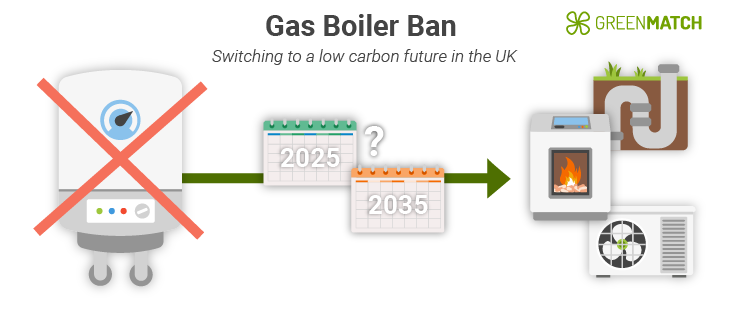- GreenMatch
- Boilers
- gas
- Gas Boiler Ban
UK Gas Boiler Ban - In Effect from 2025 or 2035?

The ban on the sale of new gas boilers in 2035 has been scrapped, according to reports released on 7th January. It’s thought the new Future Homes Standards (due to be announced by the Government later this year) will no longer include a ban on gas boilers in new builds. This means gas boilers will still be a viable option for homes across the country.
Are gas boilers being phased out?

The future of gas boilers in the UK, at this time, is unclear. In recent years, plans were drawn up to phase out gas boilers altogether. However, with a new Labour government, it seems these plans are changing.
Initial goals were set to ban the use of gas boilers in new builds, with an added ban on the sale of new gas boilers from 2035. These plans were an attempt by the previous UK government to reach an ambitious Net Zero target by 2050.
However, recent reports suggest that the current government plans to scrap these bans and instead focus on improving new home efficiency requirements.
Decarbonising UK homes poses one of the biggest challenges, especially with millions of houses that need to be retrofitted with low-carbon technologies.
Gas boilers and other fossil fuels are major barriers to achieving Net Zero, which is why government funding, like the Boiler Upgrade Scheme, is due to be extended to help support more homes' upgrades to a low-carbon option.
The UK government has announced its plan to decarbonise the nation through the Heat and Buildings Strategy. £7,500 government grants will be given to households as part of the Boiler Upgrade Scheme to promote clean heat from low-carbon technologies such as heat pumps.
The Boiler Upgrade Scheme started in April 2022 and, with additional funding announced in December 2023, is set to continue until 2028.
When will gas boilers be banned?
Recent reports indicate that the ban on gas boilers is due to be lifted. With government sources confirming homeowners will no longer have to replace or remove their boilers from their homes. Full details on the reversal of the plan will be made public later in 2025.
Will gas boilers be banned in 2025?
As part of the Future Homes Standard, new builds will have to comply with a new set of assigned high-energy efficiency measures. The full details of these standards are due to be released later this year.
It is thought that these efficiency measures will make it less likely that new homes will be fitted with gas boilers - due to the high-efficiency requirements. However, until the new homes standard is published, it’s not clear exactly how new builds may be impacted.
Plans by the last Government set out a ban on gas boilers in any new build, with an emphasis on installing low-carbon heating alternatives instead - such as air source heat pumps.
Will gas boilers be banned in 2035?
According to the latest reports (Jan. 7th), all plans to ban the sale of new gas boilers in 2035 have been scrapped. A Government source confirmed that there will no longer be an enforced ban and that people will not have to remove gas boilers from their homes.
The previous government vowed to ban the sale of new gas boilers as an additional measure to the last ‘Future Homes Standards’. At the time climate experts welcomed the bay, although warned that delay in enforcing the measure could make it “unthinkable” to achieve net zero targets.
At present it’s still unclear exactly how the current Government will approach home heating with any future plans to reduce the country's carbon emissions. Some insider indications suggest that intense backlash of the initial plans could have forced the change in direction. With primary concerns being that low carbon alternatives are still not an affordable option to all.
Why will gas boilers be banned?
Based on a report from the National Housing Federation, it is stated that homes in England contribute more to carbon emissions than cars. The research by NHF says that 25 million homes produce 58.5 million tonnes of CO2 every year, which is equal to the emissions of 28 million cars. There are 27 million cars in England that emit 56 million tonnes of CO2 every year. This is an indication that there's a need for a strong plan in order to reduce greenhouse gas emissions contributed by households.
The previous UK government, as announced in April 2021, set the most ambitious target to reduce emissions by 78% by 2035 compared to the 1990 levels. These targets included a plan for the reduction of home heating emissions by the replacement of gas boilers. However, with the new government in place, it’s yet to be announced how emissions targets will be met - as the ban on gas boilers is overturned.
What will replace gas boilers?
The UK government has been encouraging low carbon alternatives while talking about phasing out fossil fuels. There are greener alternatives to source heat that produce much lower emissions as compared to typical gas boilers.
Although replacing a gas boiler with a low carbon technology like heat pump can save a four bedroom house up to £1,300 annually on their heating bills, people need to be incentivised to bear the upfront costs of installing the pumps.
3 low carbon alternatives to gas boilers
Some of the options you can consider as alternatives to gas boilers are heat pumps, both air source and ground source, and in some cases biomass boilers may be more suitable.
Air source heat pumps provide efficient heating and cooling for both space heating and hot water systems. They cost anywhere from £8,000 - £18,000 for installing the system. Though the upfront cost is fairly high, they have low running and maintenance costs which will eventually decrease your annual energy bills. Read more about the pros and cons of an air source heat pump.
Ground source heat pumps are best suited for newly built homes where you have the scope for designing the layout and plan for installing these systems which can take significant space. They’re virtually silent and will not decrease in efficiency even in the colder months, because they source heat from the ground which has a stable temperature. If you're planning a new build you can weigh your options by considering ground source heat pump costs.
Biomass boilers are generally a cheaper option than oil-fired or gas boilers. They’re much better than gas boilers in their environmental impact and fuel costs. They’re the best alternative for properties where heat pumps may not be the right fit.
The future of heating homes in the UK will emphasize heat pumps and other low-carbon systems to move close to Net Zero targets by mid-century. With new government grants like the Boiler Upgrade Scheme, people will be able to afford heat pumps, and the difference from a gas boiler cost will not be significant.
Read more about various low carbon heating options available for your home.
Will I have to replace my gas boiler after 2025?
It is expected that newly built homes will need to install low-carbon heating technologies when the Future Homes Standard is published. This is due to stringent energy efficiency standards included in the document, which will make gas boilers less likely.
However, for existing properties, you will no longer need to worry about replacing your gas boiler - as the ban on gas boiler sales has been overturned. It is recommended that you weigh your options and consider investing in greener alternatives when it comes time to replace your boiler.
With schemes available to help decrease the cost of heat pumps and other renewable technologies - it’s a good time to take advantage of this funding, as low-carbon options are not only better for the environment, but their high efficiencies will also save you money on energy bills
Is it worth getting a new gas boiler?
Given that the future for gas boilers has just made a drastic U-turn, deciding whether to stick with what you know or opt for an alternative is entirely up to you. The good news is that gas boilers will still be available to buy for the next 10 years (at least).
However, there will come a time when you may have to replace your boiler after its lifespan. At this point, you can compare boiler costs and weigh your options. You can also choose to look at heat pumps or greener boiler alternatives (like electric or biomass).
With grants and incentives expected to continue, you can also make use of funding opportunities to upgrade to a more efficient option.

Valli has been writing well researched articles about renewable energy, sustainability and green technologies for GreenMatch since 2017. Her work has been published in various media such as Entrepreneur, Business Insider, Canadian Geographic, uSwitch, and eCycle.

We strive to connect our customers with the right product and supplier. Would you like to be part of GreenMatch?




